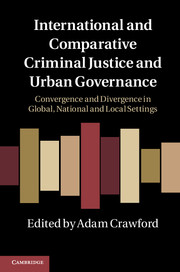 International and Comparative Criminal Justice and Urban Governance
International and Comparative Criminal Justice and Urban Governance Book contents
- Frontmatter
- Contents
- List of figures
- List of tables
- Notes on contributors
- Acknowledgements
- 1 International and comparative criminal justice and urban governance
- PART 1 International criminal justice
- PART 2 Comparative penal policies
- 8 Penal comparisons: puzzling relations
- 9 Why globalisation doesn't spell convergence: models of institutional variation and the comparative political economy of punishment
- 10 Penal excess and penal exceptionalism: welfare and imprisonment in Anglophone and Scandinavian societies
- 11 The impact of multi-level governance on crime control and punishment
- 12 Explaining Canada's imprisonment rate: the inadequacy of simple explanations
- 13 US youth justice policy transfer in Canada: we'll take the symbols but not the substance
- 14 Liberty, equality and justice: democratic culture and punishment
- PART 3 Comparative crime control and urban governance
- Index
- References
8 - Penal comparisons: puzzling relations
from PART 2 - Comparative penal policies
Published online by Cambridge University Press: 05 June 2011
- Frontmatter
- Contents
- List of figures
- List of tables
- Notes on contributors
- Acknowledgements
- 1 International and comparative criminal justice and urban governance
- PART 1 International criminal justice
- PART 2 Comparative penal policies
- 8 Penal comparisons: puzzling relations
- 9 Why globalisation doesn't spell convergence: models of institutional variation and the comparative political economy of punishment
- 10 Penal excess and penal exceptionalism: welfare and imprisonment in Anglophone and Scandinavian societies
- 11 The impact of multi-level governance on crime control and punishment
- 12 Explaining Canada's imprisonment rate: the inadequacy of simple explanations
- 13 US youth justice policy transfer in Canada: we'll take the symbols but not the substance
- 14 Liberty, equality and justice: democratic culture and punishment
- PART 3 Comparative crime control and urban governance
- Index
- References
Summary
In retrospect, it seems surprising that it had attracted so little attention before. It is hardly news – it was hardly news when Durkheim considered the matter at the end of the nineteenth century – that punishment and ideas about punishment vary between different societies, and that these variations can be related to larger social and political differences. Several theorists had postulated or investigated a possible connection (some kind of inverse relationship) between a society's welfare provision and the severity of its punishments (see for example Greenberg1999; Downes and Hansen 2006; Beckett and Western 2001). Certainly, some had spotted a link between the advance of neoliberalism in the United States and the spectacular rise in US punishment levels from the early 1970s onwards (e.g. Downes 2001). And some had made use or mention of Esping-Andersen's (1990) typology of modern capitalist welfare states in the penal context (Kilcommins et al. 2004: Chapter 7; Beckett and Western 2001). But we flatter ourselves that our 2006 work Penal Systems: A Comparative Approach (Cavadino and Dignan 2006) demonstrated just how illuminating was the Esping-Andersen schema when applied to comparative penology.
To recapitulate briefly: Esping-Andersen delineated three types of contemporary capitalist political economy: the free-market neoliberal polity (exemplified archetypally by the United States of America); the more communitarian conservative corporatism (exemplified by Germany) and the social democratic corporatism found in the Nordic countries (the prime example being Sweden). To these we added what we call the oriental corporatism of Japan.
- Type
- Chapter
- Information
- International and Comparative Criminal Justice and Urban GovernanceConvergence and Divergence in Global, National and Local Settings, pp. 193 - 213Publisher: Cambridge University PressPrint publication year: 2011
References
- 6
- Cited by


